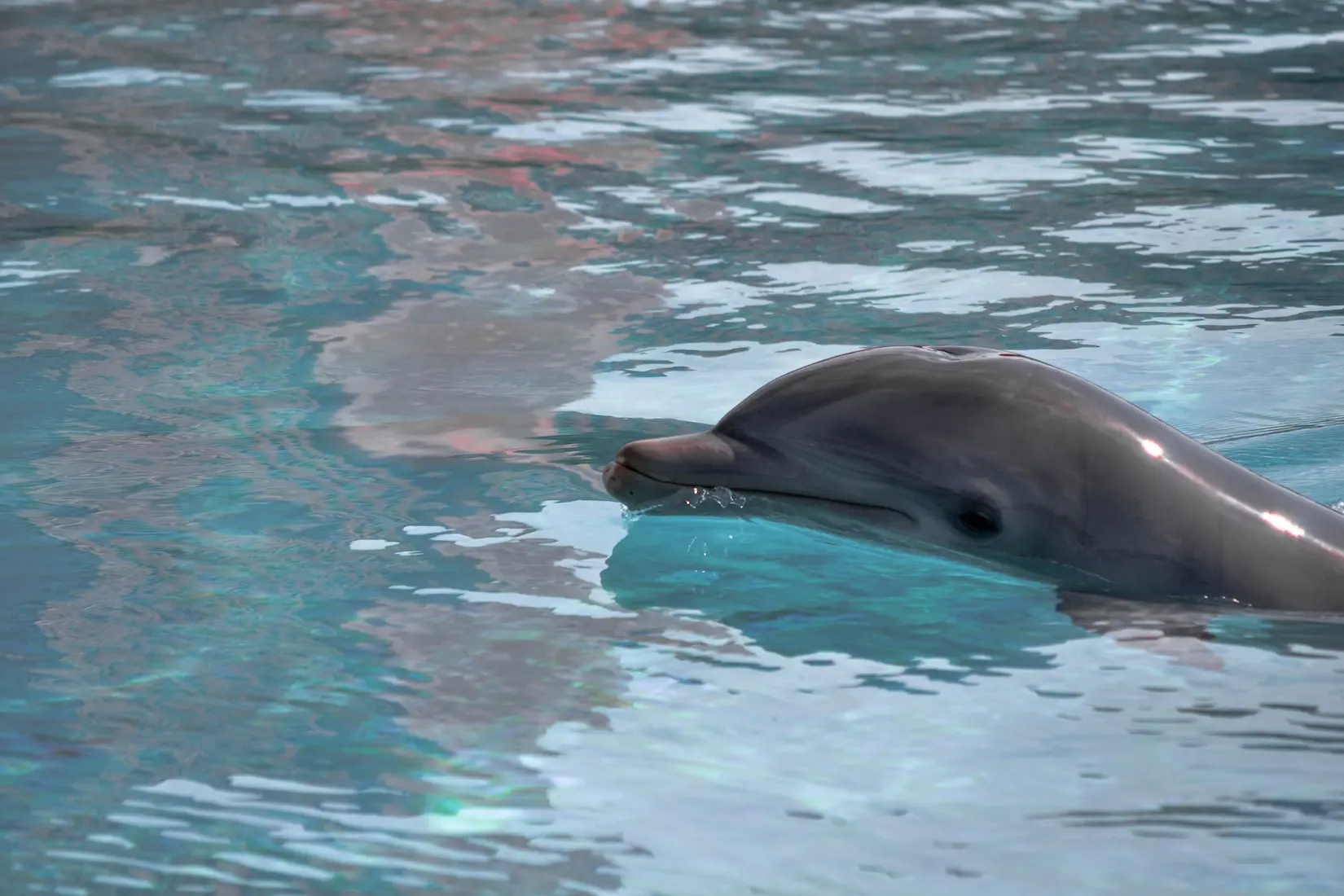Interesting facts about dolphins are truly astounding. The fascinating interactions between wild dolphins and humans have long captivated the imagination of many. Dolphins, known for their intelligence, playful nature, and complex social structures, often display a unique curiosity towards humans. This curiosity leads to remarkable and memorable encounters, ranging from dolphins swimming alongside boats to playful interactions in the water.
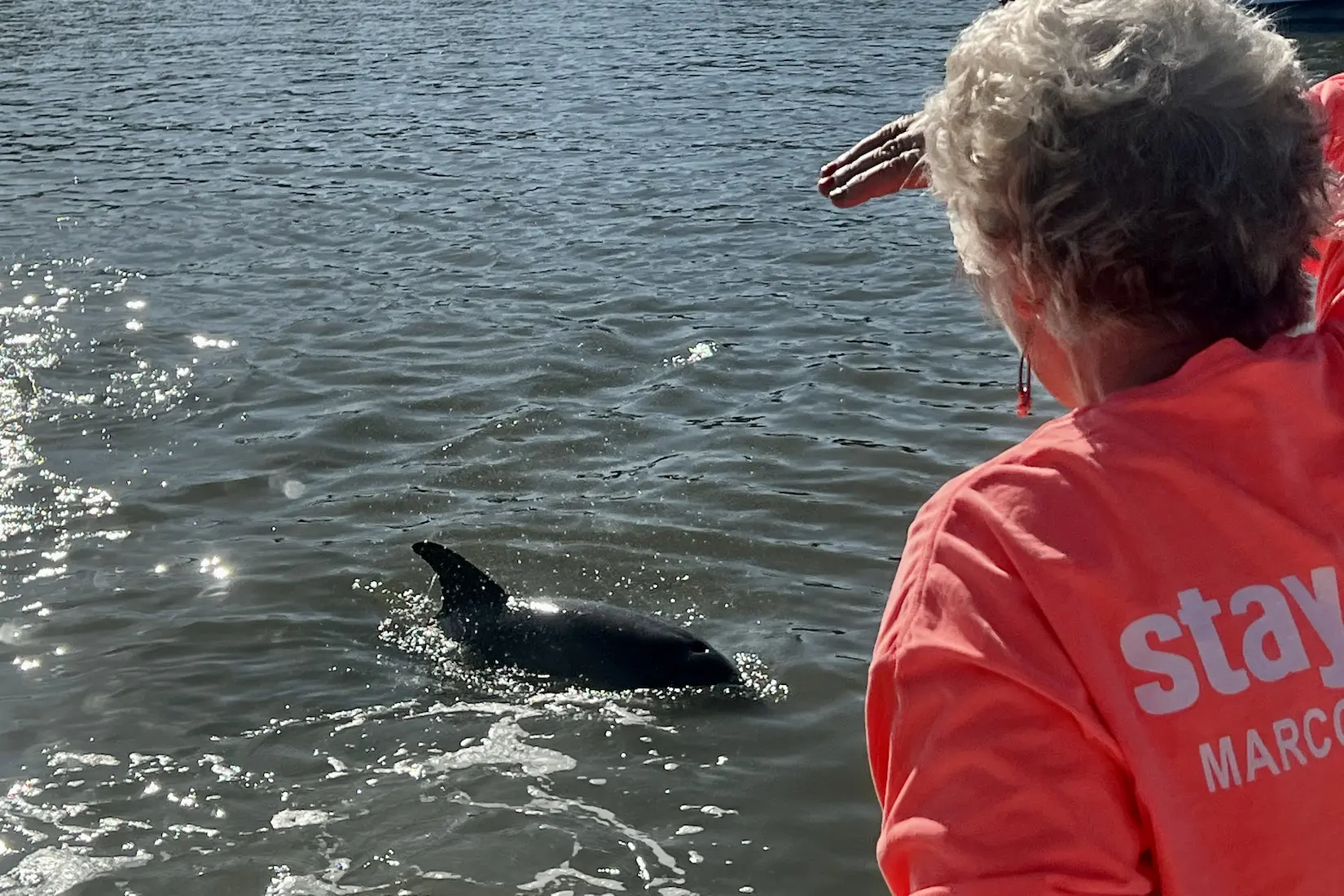 How Do Wild Dolphins Interact with Humans?
How Do Wild Dolphins Interact with Humans?
These interactions are possible and frequent in various parts of the world, including the stunning Marco Island and the 10,000 Islands. Here, visitors can witness dolphins in their natural habitat, exhibiting behaviors that showcase their intelligence and social bonds. These encounters provide a window into the lives of these incredible marine mammals.
Natural Behaviors of Wild Dolphins
While these interactions can be magical, it’s important to approach them with respect and understanding. Ensuring that our presence does not disrupt their natural behaviors is crucial. By adhering to ethical guidelines and responsible practices, we can enjoy these encounters without causing harm to the dolphins.
Ready to experience the magic of dolphin interactions firsthand? Book Your Tour Online with Florida Island Tours and embark on an unforgettable dolphin excursion in Marco Island and the 10,000 Islands!
Interesting Facts about Dolphins: Behaviors of Wild Dolphins
Wild dolphins exhibit various natural behaviors that reflect their intelligence, social nature, and adaptability. One of the most captivating aspects of dolphin behavior is their sophisticated communication system. Dolphins use a combination of clicks, whistles, and body movements to convey messages to each other, often coordinating intricate social structures and group activities.
How Dolphins Hunt
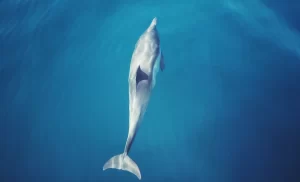
Play is also a significant part of a dolphin’s life. They are known for their playful antics, such as riding the waves created by boats, leaping out of the water, and engaging in games with objects like seaweed or small fish. These activities are not just for fun; they also help dolphins develop social bonds and physical skills essential for survival.
Dolphins: Taking Care of One Another
Moreover, dolphins exhibit altruistic behavior, often coming to the aid of injured or sick members of their pod. This strong sense of community and empathy is one of the reasons humans so admire dolphins.
Understanding these natural behaviors enriches our appreciation of dolphins and underscores the importance of observing them in a way that respects their natural environment. By doing so, we can ensure that these incredible creatures continue to thrive in the wild.
Interesting Facts About Dolphins: Why Dolphins Approach Humans
One of the most intriguing questions for marine enthusiasts is why dolphins approach humans. Understanding the motivations behind this behavior can provide insights into the complex minds of these intelligent creatures.
Naturally Curious
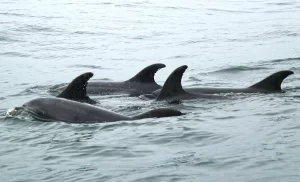
Social Interaction
Another reason dolphins may approach humans is for social interaction. Dolphins are highly social animals that thrive on interaction with their pod members. In areas where human activity is common, they may extend this social behavior to include humans, treating them as part of their social network. This can be particularly evident in places where dolphins have become accustomed to human presence over time.
Food
Food can also be a motivator. In some cases, dolphins have learned that humans can be a source of easy food, either through direct feeding or as a byproduct of fishing activities. However, it’s crucial to note that feeding wild dolphins is highly discouraged and can lead to dependency and disruptive behaviors.
Playfulness
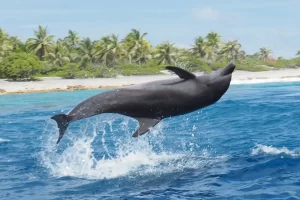
While these interactions can be magical experiences, it’s essential to approach them with respect and caution. Ensuring our presence does not disrupt their natural behaviors or habitat is key to fostering a sustainable and healthy coexistence.
Interesting Facts about Dolphins: Risks and Challenges
While interacting with wild dolphins can be a thrilling experience, it is essential to acknowledge the risks and challenges associated with such encounters. Understanding these factors can help ensure both human and dolphin safety and the well-being of marine ecosystems.
Physical and Health Risks to Dolphins
Physical risks are among the most immediate concerns. Despite their friendly reputation, dolphins are powerful animals with strong jaws and sharp teeth. An unexpected movement or perceived threat could lead to accidental injuries. Additionally, close encounters in open water can be risky due to currents, waves, and the potential for being struck by a dolphin’s tail or fins.
There are also health risks to consider. Like all wild animals, dolphins can carry diseases transmissible to humans, such as brucellosis and various viral infections. Conversely, humans can also pose a health risk to dolphins, introducing pathogens into their environment that their immune systems cannot handle.
Behavioral Changes to Dolphins
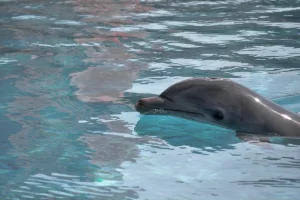
Moreover, the presence of boats and swimmers can disrupt habitats. Noise pollution from boat engines can interfere with dolphin communication and navigation, while physical presence can cause stress and displace dolphins from their natural habitats.
Interesting Facts: Ethical Challenges for Dolphin Interactions
Finally, there are ethical challenges to consider. Respecting the boundaries of wild dolphins and ensuring that interactions are non-invasive and do not cause harm is crucial. Adhering to guidelines and regulations designed to protect marine life is essential for sustainable and responsible wildlife tourism.
Ethical Considerations of Dolphin Interactions
Engaging with wild dolphins is a mesmerizing experience, but it is crucial to consider the ethical implications of such interactions. Ensuring these encounters are respectful and non-invasive is vital for preserving these intelligent marine mammals and their natural habitats.
Dolphin Ethical Considerations
One of the foremost ethical considerations is respecting the autonomy of wild dolphins. These creatures have complex social structures and behaviors, and human interactions should not disrupt their natural activities. Approaching dolphins too closely, feeding them, or attempting to touch them can cause stress and interfere with their normal routines.
Adhering to established guidelines and regulations is another critical aspect. Many regions have specific laws designed to protect marine life, including maintaining a safe distance from dolphins and avoiding practices that could harm them. Following these guidelines helps to minimize negative impacts and ensure that dolphin populations remain healthy and undisturbed.
Another ethical issue is the potential for habitat degradation. Frequent human presence can lead to pollution, noise disturbances, and physical disruption of marine environments. Responsible tourism involves avoiding littering, reducing noise levels, and choosing tour operators committed to sustainable practices.
Dolphin Education
Educational efforts are also an important ethical consideration. Promoting awareness and understanding of the lives and needs of wild dolphins can foster a more respectful approach to interactions. Tour operators and guides should provide information on how to engage with dolphins responsibly and emphasize the importance of conservation.
Interesting Facts: Dolphin Conservation
Finally, consider the broader impact of these interactions on conservation efforts. Supporting organizations and tours that contribute to the protection and research of dolphin populations can help ensure that these magnificent creatures continue to thrive in the wild. By making informed and ethical choices, we can enjoy the wonder of wild dolphins while contributing to their long-term preservation.
Best Practices for Safe Dolphin Encounters
Observing wild dolphins in their natural habitat is an exhilarating experience, but it’s essential to follow best practices to ensure the safety and well-being of both the dolphins and yourself. Here are some key guidelines to make your dolphin encounter enjoyable and respectful.
Watch from a safe distance
First and foremost, always maintain a safe distance. An interesting fact is approaching dolphins too closely can cause them to stress and alter their natural behaviors. It is recommended to stay at least 50 yards away from dolphins. If they choose to come closer to you, remain calm and avoid sudden movements.
No feeding wild dolphins
Avoid feeding dolphins under any circumstances. Feeding can disrupt their natural hunting patterns and make them dependent on human-provided food, leading to health issues and behavioral changes. Wild dolphins have complex diets that are best sourced from their natural environment.
Keep the noise down
Keep the volume of engines, radios, and other devices low to minimize noise pollution. Dolphins rely heavily on echolocation to navigate and hunt; excessive noise can interfere with these essential activities.
Approach gently
When observing dolphins, use a parallel approach rather than a head-on approach. This method is less intrusive and allows dolphins to maintain their course without feeling threatened. Avoid making abrupt changes in speed or direction when near these sensitive creatures.
Don’t pollute
It’s equally important to be mindful of the environment. Avoid littering and dispose of waste properly to prevent pollution that can harm marine life. Choose eco-friendly sunscreens and avoid single-use plastics to reduce your environmental footprint.
Dolphin Boat Tour Agency
Lastly, choose a tour operator that prioritizes sustainable and ethical practices. Look for companies that adhere to established guidelines and contribute to conservation efforts. By supporting responsible tourism, you can help ensure that dolphin populations remain healthy and thriving.
Interesting Facts about Dolphins: Dolphin Boat Tours
Ready to experience the magic of wild dolphins? Book Your Tour Online with Florida Island Tours and embark on an unforgettable adventure in Marco Island and the 10,000 Islands. Dive into a world of wonder while practicing safe and respectful dolphin encounters!



